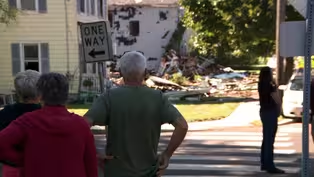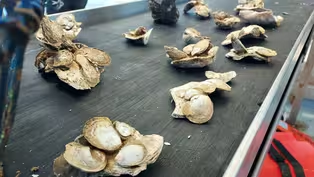NJ Spotlight News
Fighting addiction with pregnant women and new mothers
Clip: 7/2/2024 | 4m 57sVideo has Closed Captions
Addiction is leading cause of maternal deaths in NJ
New Jersey has worked for years to improve maternal health outcomes, but one of the greatest challenges has been addressing pregnant or new mothers who face addiction, as many patients deal with feelings of guilt and doctors who aren’t trained to treat the illness.
Problems playing video? | Closed Captioning Feedback
Problems playing video? | Closed Captioning Feedback
NJ Spotlight News is a local public television program presented by THIRTEEN PBS
NJ Spotlight News
Fighting addiction with pregnant women and new mothers
Clip: 7/2/2024 | 4m 57sVideo has Closed Captions
New Jersey has worked for years to improve maternal health outcomes, but one of the greatest challenges has been addressing pregnant or new mothers who face addiction, as many patients deal with feelings of guilt and doctors who aren’t trained to treat the illness.
Problems playing video? | Closed Captioning Feedback
How to Watch NJ Spotlight News
NJ Spotlight News is available to stream on pbs.org and the free PBS App, available on iPhone, Apple TV, Android TV, Android smartphones, Amazon Fire TV, Amazon Fire Tablet, Roku, Samsung Smart TV, and Vizio.
Providing Support for PBS.org
Learn Moreabout PBS online sponsorshipNew Jersey has worked for years to improve maternal health outcomes.
The state has the fourth highest maternal mortality rate in the country, and those outcomes are even worse for Black women in New Jersey.
One of the hardest issues to treat during pregnancy is addiction.
As many patients deal with stigma, feelings of guilt, and doctors who aren't trained to treat it, especially in pregnant women.
In part one of a two part report, Joanna Gagis speaks to doctors and addiction specialist about the gap in treatment for pregnant women and the support available.
I can't think of a more stigmatized population than pregnant people using substances.
Dr. Mollie Nisen is one of a small number of medical providers in the state who treats people struggling with addiction during pregnancy and after delivery.
She works with a program at Cooper University Hospital in Camden County.
We have so many images of what a parent or a mother is supposed to look like.
And regardless of the intentions of, I'm sure, very well intentioned clinicians, a lot of people don't know what to do clinically in this scenario.
It's that not knowing, among other systemic problems that makes addiction during and after pregnancy, the number one leading cause of maternal death in the state.
It was actually 58% of pregnancy related deaths.
So that's the single greatest contributor to death in pregnancy and related to pregnancy or within that first year postpartum.
It's a startling number, given all the state's been doing to reverse maternal and infant deaths in recent years.
But why is this population so vulnerable?
Dr. Kaitlan Baston is New Jersey's commissioner of the Department of Health, who worked as an addiction clinician before stepping into this role and has seen firsthand how health care systems in the state are not set up to care for this population.
They often get turned away.
Providers don't necessarily feel comfortable or know how to treat people in pregnancy.
They get turned away from inpatients if they try to go to a detox or a stabilization.
They may get turned away because they say, Oh, we can't, we can't treat you.
You're pregnant.
The emergency rooms get all of these people in all the time and they don't know what to do with them.
They don't they can't keep them because their problems are not at the level of a hospital intervention, but they don't have a proper discharge plan for them.
Dr. Ed Ratush is the medical director at the Center for Great Expectations in Somerset that treats addicted women from the prenatal stage through six years postpartum.
So most of the discharges like this that come into the emergency room leave to a homeless shelter.
And so we need more opportunities to intervene in that process where more organizations that can do something are tapped to do something.
Without a specialized program.
The average OBGYN office does not have all of the resources necessary to help support these patients who have such complex psychosocial needs.
And yet so many OB-GYNs don't even know where to refer pregnant women who come to their door.
Like, for example, with our organization, the vast majority of adolescents that could use our services are adult women that could use our residential services have no idea we exist.
And when they're not referred to places that are set up for the unique care they require, they're often met with stigma.
That Doctor Nisen says only adds to the trauma they're already experiencing.
So whether that be not having their withdrawal well controlled and feeling incredibly sick when they were sitting in the emergency room, whether that be having their belongings searched and feeling stigmatized or feeling like their illness was they were blamed for their addiction rather than it being acknowledged as an illness that they did not choose to have.
Plus, they're so often met with misinformation, especially when it comes to medication and pregnancy.
They may feel stigmatized for the medication they're on, such as methadone or buprenorphine, which are two FDA approved medications for the treatment of opioid use disorder.
They may have been told that their baby's going to be born addicted to those medications, and therefore they're a bad mother.
Medications to treat opioid use disorder are safe in pregnancy, and they improve outcomes not just for the pregnant person or the mom, but also for the infant.
Dr. Nisen would like the state to require physicians, including OB GYNs, to take a refresher course that includes addiction and mental health care training as part of maintaining their medical license.
In our next piece, we'll take a look at recovery and support programs that are making a difference and are reversing maternal deaths in the state.
For NJ Spotlight News, I'm Joanna Gagis.
Support for the medical report is provided by Horizon Blue Cross Blue Shield of New Jersey and independent licensee of the Blue Cross Blue Shield Association.
Bill Spadea keeps radio show, ELEC declines to act
Video has Closed Captions
Clip: 7/2/2024 | 4m 18s | ELEC examined whether show gives him ‘in-kind’ benefit in race for governor (4m 18s)
NJ offshore wind project receives key approval
Video has Closed Captions
Clip: 7/2/2024 | 4m 52s | Interview: Joris Veldhoven, CEO of Atlantic Shores (4m 52s)
Putting Ida mortgage payments, foreclosures on 1-year hold
Video has Closed Captions
Clip: 7/2/2024 | 4m 8s | The measure, which passed unanimously in Assembly and Senate, awaits Murphy’s signature (4m 8s)
Shell recycling program aims to bolster NJ's oyster beds
Video has Closed Captions
Clip: 7/2/2024 | 3m 53s | Nearly 100 tons of recycled shells were collected from Atlantic City area restaurants (3m 53s)
Providing Support for PBS.org
Learn Moreabout PBS online sponsorship
- News and Public Affairs

Top journalists deliver compelling original analysis of the hour's headlines.

- News and Public Affairs

FRONTLINE is investigative journalism that questions, explains and changes our world.












Support for PBS provided by:
NJ Spotlight News is a local public television program presented by THIRTEEN PBS



